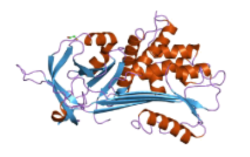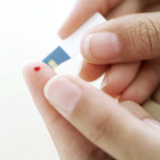Alpha 1 antitrypsin deficiency, also called Alpha-1, A1AD or AATD, is a genetic disorder that can affect the liver and/or lungs.
Everyone’s liver produces the protein alpha 1 antitrypsin (AAT) The job of AAT is to protect the body from inflammation, especially in the lungs. In people with Alpha-1 their AAT is malformed and cannot be released by their liver. Most commonly, but not always, this leads to lung, and occasionally liver problems in later life. It can also cause the skin condition panniculitis and even problems with the pancreas, but these complications are very rare.
In some infants and children, the accumulation of the malformed AAT before birth can cause liver problems. Unfortunately, there are always a few children who are seriously affected by liver disease very early in life.
However most infants and children will have no ill effects. For those that do, the most obvious sign is usually jaundice during the first few weeks. Often, this will clear after a while and the child will recover to have a normal, healthy childhood.
While it is important to know that not everyone who has Alpha-1 will develop symptoms, even people who are “only carriers” sometimes do. We still don’t know why this is so, but we do know that early detection, treatment and lifestyle changes can make a dramatic difference in the progress of disease. As a result, the sooner a diagnosis is made the more effective lifestyle and treatment options will be for all the family.
How did my child get alpha 1 antitrypsin deficiency?
 As I’m sure you know we are all made up of many, many pairs of genes. For each pair we inherit one from each parent. Pi stands for protease inhibitor of which alpha 1 antitrypsin is just one. A “normal” person is called PiMM i.e. they have two normal genes, this means that they produce a full supply of AAT. Sometimes a faulty gene is thrown into the mix; the most common abnormal gene is called the Z gene (there are other variations but since they all follow the same pattern we’ll stick with the Z). For someone to be PiZZ they must have inherited a faulty gene from each parent, which means in turn that their parents must have had at least one Z gene (usually MZ).
As I’m sure you know we are all made up of many, many pairs of genes. For each pair we inherit one from each parent. Pi stands for protease inhibitor of which alpha 1 antitrypsin is just one. A “normal” person is called PiMM i.e. they have two normal genes, this means that they produce a full supply of AAT. Sometimes a faulty gene is thrown into the mix; the most common abnormal gene is called the Z gene (there are other variations but since they all follow the same pattern we’ll stick with the Z). For someone to be PiZZ they must have inherited a faulty gene from each parent, which means in turn that their parents must have had at least one Z gene (usually MZ).
It therefore follows that an MZ carrier partnered with someone who has normal MM genes, would have children who are either MZ carriers or completely normal, with MM genes.
Carriers of A1AD have less AAT than “normal” people but they usually have enough in their bloodstream to prevent serious problems.
It isn’t really understood why but all alphas, including some carriers, do seem to be more susceptible to picking up colds and ‘flu. Therefore, it is just as important for carriers to look after themselves.
| Try to remember, if your child is ill, it is not your fault. No one is to blame for their genetic inheritance. |
I am so worried, how do I cope?
Remember, you are not alone, there are other parents who are faced with the same worries. There are people who understand and can help, even if it’s just someone to talk to. You can contact us at www.alpha1.org.uk where you will find support and practical help.
You must not blame yourself, you or your loved one may feel responsible but you are not. The genetic situation which resulted in your child’s Alpha-1 condition is something which you had no control over. The important thing is what you do now and what you can do to provide the best care for your child. Learn as much as you can about A1AD, understanding is the key to the future.
You can take control of the situation though, you may feel helpless but there are a lot of positive things you can do.
For example, you can make sure that you are giving your child a healthy diet. You can provide a dust free, smoke free environment for your child to grow up in. These are just some of the things that will make a difference to your child’s quality of life both now and in the future. As well as improving your own health, if you are also an alpha.
What will happen now?
Most alpha children enjoy a perfectly normal childhood and, other than routine checks, they will not need any special treatment.
It is important however, that your family doctor is aware of the deficiency and the need to refer anything significant to a specialist. They should also be aware that chest infections need urgent treatment, in order to help prevent possible lung damage which may cause problems in the future.
It would also be advisable to ask about the annual ‘flu vaccination which is recommended for all alphas.
If your child has regular hospital checks because of liver symptoms, then these are some of the things the specialists will be checking:
- Firstly they will need to monitor that growth and development are progressing normally, which is always a good sign.
- Liver function is also something that will need regular monitoring (this will probably involve blood tests, scans and possibly a liver biopsy), to make sure any complications are recognised at an early stage and treated quickly. As things become more stable, hospital visits will probably become less frequent.
Do I need to treat my child differently?
No, as far as possible, it is important that your child is treated the same as any other. Unless your hospital advises you differently, all the usual vaccinations should be given. You may be advised to let your baby have other vaccines too, but these will be discussed with you.
Unless there are complications, most normal childhood activities should be possible and encouraged. If you have any particular worries then please ask your doctor for advice. Of course, all alpha children should be taught that smoking and drinking large amounts of alcohol is particularly bad for alphas.
Will my child have serious liver problems?
Unfortunately this is something which cannot be accurately predicted, studies have shown that around 15% of babies born with A1AD had some liver problems in infancy. By following up these children throughout childhood it was found that:
- 25% had no symptoms of liver disease at the age of 10.
- 45% had some indicators of liver disease in blood test results.
- 5% had serious disease and needed a liver transplant during their first year of life.
- The remaining 25% needed a liver transplant at some point during their during childhood. These were the children whose liver disease had progressed and the liver had become permanently damaged by severe scarring of the tissue (cirrhosis).
Remember, the figures for transplant are actually very small compared to the total number of alpha babies born. However for those who do need a transplant, liver transplantation in children is usually very successful, it corrects the deficiency, and survival rates are very encouraging.
How is alpha 1 antitrypsin deficiency treated?
Unfortunately, there is no specific treatment or cure as yet for A1AD. However, the team caring for your child will do their best to make any symptoms less of a problem. Some of the ways they may be able to help include:
- Making changes to the diet as babies and children with liver problems sometimes have poor bile production and are not able to absorb all the nutrients in the food they eat. This means they may not gain weight as they should, or possibly they may even lose weight.
Any changes to the baby or child’s diet will be advised by a dietician and some of the things they may consider are:
- Babies often do better with a special milk formula rather than ordinary or breast milk. The special milks are more easily absorbed, even when the baby is jaundiced. Special powders may also be added making the milks more nutritious.
- Older Children may also require extra calories, which can be given in the form of high calorie drinks.
- Extra vitamins, especially vitamin K may be given. This helps the blood to clot normally.
Will liver problems develop later?
As already mentioned most A1AD children do not have any significant problems, other than a predisposition for picking up colds and ‘flu. However occasionally, children do develop liver problems, for some this may not become apparent until the child is older when they could develop some of the following symptoms:
- Jaundice
- Ascites: This is a swelling of the abdomen caused by a build up of fluid.
- Portal hypertension: This means there is increased pressure in some internal blood vessels caused by scarring of the liver. This may result in blood being vomited or passed in the stools.
Some children may also be found to have an abnormality of the kidneys. This doesn’t usually interfere with kidney function but it may increase the risk of kidney problems if a transplant is needed.
Be involved in your child’s health care?
It is very likely that your child or children will have no serious problems at all during childhood or beyond, just because they have been diagnosed with A1AD does not necessarily mean they will become ill. There are many alphas who live to a grand old age without any serious complications at all.
A positive diagnosis of A1AD gives you the opportunity to take steps to avoid risk factors and limit symptoms.
Proper care by you and your doctors can have significant, positive effects for the rest of your child’s life.
Remember, not everyone with A1AD develops symptoms and lifestyle changes that can be made, will significantly help to avoid complications both now and in the future.
Therefore, appropriate medication, treatments, exercise, and lifestyle choices, can go a long way toward ensuring a long and happy life.
Your doctor or consultant is the best person to provide information about the medications and treatment available, and to look after your child in medical terms, but there are important steps you can take to help take care of your family.
It is important that you develop a good relationship with your doctors and consultants. Things are improving, but unfortunately, many are still not very knowledgeable about A1AD, so they may not always have the answers you are looking for. For that reason it is important to research and gain as much knowledge about A1AD as you can.
One of the first things you need to know is which A1AD genes all of your family have, without that knowledge it is difficult to know how the diagnosis will affect them.
Testing for alpha 1 antitrypsin deficiency
 Testing for A1AD is simple and quick. It is usually done with a blood test. People at risk from alpha 1 antitrypsin deficiency should be tested.
Testing for A1AD is simple and quick. It is usually done with a blood test. People at risk from alpha 1 antitrypsin deficiency should be tested.
Who should be tested for alpha-1 antitrypsin deficiency?
The World Health Organisation (WHO), the American Thoracic Society, Alpha-1 Canada, Department of Health here in the UK, recommend that everyone with COPD be tested for A1AD.
- Everyone with emphysema, chronic obstructive pulmonary disease (COPD), chronic bronchitis or asthma that is not fully responsive to treatment.
- Individuals with bronchiectasis.
- Newborns, children and adults with unexplained liver disease.
- Individuals with a family history of liver or lung disease.
- Blood relatives of persons diagnosed with alpha-1 antitrypsin deficiency.
- Anyone with panniculitis, a skin disease.
Your family’s future with A1AD
 Those who are all symptom free, have a good chance of remaining so by making small but important changes in the way they live.
Those who are all symptom free, have a good chance of remaining so by making small but important changes in the way they live.
Cigarette smoke is the greatest risk factor for developing life threatening symptoms in adulthood. If you or your partner smoke then the single most important thing you can do to help your child, and all your family, is to give up immediately. Passive smoking should also be avoided wherever possible.
Avoid other lung irritants, especially environmental pollutants used in agriculture, mineral dust, gas and fumes.
Regular exercise, fresh air and good nutrition are beneficial in maintaining lung health.
Children should learn that they must avoid things such as an excess of alcohol, street drugs and some over the counter drugs which can all cause extra harm to the liver.
Help liver function, by providing a well balanced diet that contains plenty of fruits and vegetables. This is essential to provide the liver with the antioxidants that it needs to protect against inflammation.
A healthy diet should provide enough vitamins and minerals. Large quantities of the fat soluble vitamins can damage the liver so supplements should be taken with care and should never be given to children unless advised by a doctor.
Researchers around the world are studying A1AD and learning more all the time.
